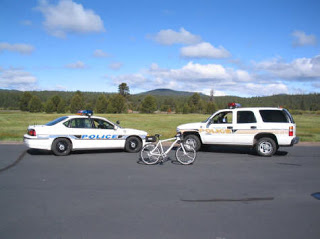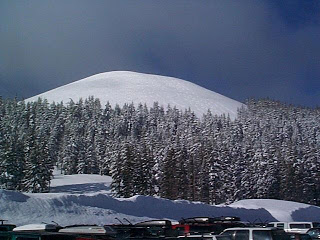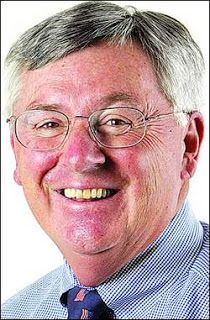An Allergy to Freedom (UPDATE, June 1)

The view from Sunriver,
a beautiful Oregon community where, at present, the police can only deal with actual threats to life and property. Kind-hearted folks in the State Legislature are working at this very minute to change that.“You need to buckle up your kids!” a shrill, insistent voice commanded from across the parking lot. “It is the law, you know.”
My patience already whittled down to a stub following a typically exhausting shopping excursion (a fairly major undertaking, since five small children were involved), I fixed my tormentor with a theatrically polite smile. She seemed like a pleasant enough middle-class mother, apart from the look of smug civic rectitude radiating from her face.
“Why, thank you for that reminder, deputy,” I called out before planting myself in the driver’s seat of our mini-van and driving off. I neither buckled in our kids, nor checked for a reaction from the Dutiful Pillar Of Law And Order who had issued the rebuke.
Although Oregon – where this encounter occurred – has a “primary” seatbelt law, I didn’t have to buckle up, nor did any of the passengers, while we were in the parking lot: Only those driving on “highways” (a category including any public street) are required to wear seat belts under threat of a citation. This will quite possibly change soon in Oregon, in large measure because of the kind of reflexive, freedom-aversive conformity displayed by the moral tutor I encountered in the parking lot.

Police in those towns are presently forbidden to detain and cite drivers who commit trivial violations of minor traffic laws. They retain the power to arrest those who are caught endangering others through reckless driving, of course. But in those two Oregon towns, the police can’t stop a driver or issue a ticket for committing any of the malum prohibitum-type infractions on which so many municipal departments thrive. And it’s driving them crazy.
“No seatbelt? No citation. No tail light? No ticket. In too much of a hurry? Not to worry,” summarized a March 3 AP dispatch from Sunriver. “Sgt. P.J. Beaty watches people in this upscale development breaking traffic laws, and sees plenty of them. But he can’t pull them over. A man swerved head-on into Beaty’s lane, and then back out again and Beaty couldn’t law a glove on him.”
Last winter, a dispute flared up between the Sunriver Owners Association, the de facto government of the 2,000 resident vacation community, and the Sunriver Service District, which governs the police and fire department, over the status of Sunriver’s roads, which are considered private but open to the public. In February, the Service District ordered police to consider the roads exempt from minor vehicle infractions.
As a result, the Sunriver Police “can only stop drivers for what the state [of Oregon] calls traffic crimes, such as drunken or reckless driving” and they have removed their radar units from their patrol cars.
In Black Ranch, which is also governed by a private homeowners association, police officers do enforce minor traffic laws, but they can only issue “ranch citations” which do not appear on an individual driving record.
It is important to recognize that the police in both villages were not impeded in any way from dealing with situations in which a depraved person turns his automobile into an instrument of mayhem. They were simply forbidden to stop people for anything less than behavior that directly threatened the lives, persons, and property of those living in the community.
“There’s not been any rampant crime here,” Sunriver resident Susan Lawson told me. Lawson, who works for the Sunriver Scene, the publication of the Sun River Owners Association, pointed out that many critics of the police restrictions believed that the village would quickly become a haven for drag racers and other maniacal motorists. She dismissed those concerns with a quiet chuckle.
“If you know Sunriver’s roads, you’d know this was impossible,” she related. “They’re curvy and lined with trees. There are deer everywhere. And we have roundabouts, or traffic circles, at several locations, So it’s not as if the city is laid out to encourage drag-racing.”
“All the panic over the situation was completely unwarranted,” Lawson continued. “The police haven’t gone away, and they can certainly intervene where someone is endangering others. They’re still on patrol, and if someone were robbing the mini-mart up the road the police would obviously have the power to arrest the suspect. The police are simply not permitted to enforce a very small number – it’s either six or eight – of laws dealing with minor traffic infractions, because our roads are the equivalent of private property.”
And the problem with this is…?
If the police are restricted to dealing only with legitimate threats to life, person, and property, what’s the emergency? Why are Sunriver civic leaders so anxious to change (.pdf) this uniquely attractive status quo?
HB 3445 (.pdf), which was sponsored by Republican (natch) state representative Gene Whisnant, treats Sunriver’s situation as an emergency. It would expand the definition of highways to include “every public way … and place … within the boundaries of this state, open, used, or intended for use of the general public for vehicles or vehicular traffic as a matter of right,” including “premises open to the public that are owned by a homeowners association….”
One all but inevitable side-effect of this law, by my reading, would be the application of traffic laws to private roads and parking spaces; indeed, Oregon State Police Lt. Carl Rhodes used the example of “a supermarket parking lot” to describe the present status of Sunriver’s roads. So it’s entirely reasonable to believe that once the measure is passed, revenue-leeching Oregon police will have the power to cite drivers who fail to buckle up before pulling out of a parking space in front of a supermarket. Which would meet with the approval of the sweet lady referred to above.
Whozat? Whisnant — Eugene Whisnant, Sunriver’s representative in the Oregon State Legislature.
Whisnant and co-sponsor Rep. John Dallum have called for that measure to be amended with an emergency clause implementing its provisions immediately.
Once again I must ask: If everything in Sunriver is, as Susan Lawson (a supporter of HB 3445) told me, “really quiet” in Sunriver, what’s the rush to change things?
One oft-stated concern is the fact that the town’s population often expands from 2,000 to 10,000 or more during Summer tourist season. Is the assumption here a) that all of these people are looking for an excuse to run amok behind the wheel; or b) that many of those people would be frightened by the prospect of spending some time in a town where drivers enjoy a modicum of freedom from police harassment?
I suspect the genuine source of urgency here is found in the joint testimony offered by the Sunriver Service District and Owners Association to the Oregon legislature on April 12: “[The] change in enforcement has received wide-spread publicity, which has, unfortunately, affected Sunriver’s reputation as a safe vacation destination.”
This is a version of option “b” — fear that a “reputation” growing out of a little additional freedom might somehow act as a tourist repellent, despite the fact that Sunriver had somehow avoided descending into Hobbessian anarchy after the police were put on a shorter leash.
Perhaps this is a correct assessment of the public Sunriver is trying to attract. Maybe the termagant from my parking lot encounter is entirely representative of contemporary Americans – people who have come to believe that safety is the divine State’s gift to its dutiful subjects, who seek the comforting embrace of obedient conformity.
In any case, this episode offers a small illustration of the process through which tiny but promising eruptions of freedom are quickly suppressed.
UPDATE
In a very pleasant phone conversation, Rep. Whisnant explained to me that his intention was to craft a bill that would be “specific to Sunriver and Black Butte Ranch,” permitting the police in those particular villages “to enforce all of the state traffic laws,” and that he didn’t believe it would apply to other private roads and parking spaces.
This is certainly true of the second sentence of the brief measure, which focuses on “premises open to the public that are owned by a homeowners association” — which describes Sunriver and Black Butte Ranch. However, the first sentence just as clearly offers the broad and inclusive definition of “highway” referred to above. When I asked Rep. Whisnant about this, he said that this was “boilerplate info inserted into the bill by lawyers” — which is where trouble of the sort I’m anticipating often begins, of course.
Born and raised in North Carolina, Whisnant married a fourth-generation Oregonian and moved to The Beaver State following retirement.
While he seems to be on amicable terms with most of his constituents, Whisnant knows that at least one former resident of his district isn’t happy with HB 3445.
“Just this morning I heard a message from a friend of mine, a former mayor who now lives in Hawaii. He wasn’t pleased with the bill,” Whisnant told me. “He told me that my job `is to get rid of bills, not to move more of them through.’ That’s generally what I’d prefer to do, of course, but it seems that every session we end up with more [laws] than we began with.”
A spartan new editon of Pro Libertate: the e-zine is now available at The Right Source.
Content retrieved from: http://freedominourtime.blogspot.com/2007/05/allergy-to-freedom.html.





